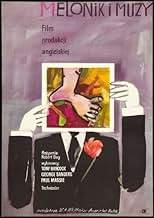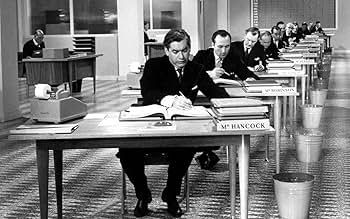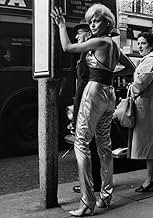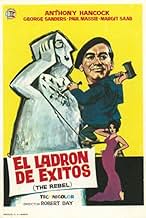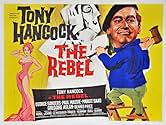The Rebel
- 1961
- 1h 45min
VALUTAZIONE IMDb
6,8/10
1257
LA TUA VALUTAZIONE
Aggiungi una trama nella tua linguaTony Hancock gives up his day job to become an artist. He's a lot of enthusiasm, but little talent, and critics dislike his work. Nevertheless, he impresses a talented artist.Tony Hancock gives up his day job to become an artist. He's a lot of enthusiasm, but little talent, and critics dislike his work. Nevertheless, he impresses a talented artist.Tony Hancock gives up his day job to become an artist. He's a lot of enthusiasm, but little talent, and critics dislike his work. Nevertheless, he impresses a talented artist.
- Regia
- Sceneggiatura
- Star
- Nominato ai 1 BAFTA Award
- 1 candidatura in totale
Gary Cockrell
- Artist
- (as Gary Cockerill)
Recensioni in evidenza
This one is a long-time favourite for its great one-liners, its wit, its bright colours and the sheer joy of its performances. George Sanders plays the creepy critic with the same finesse he'd done many times before, Hancock as the leader of the Infantile school of painting is so preposterous its hysterical, even a very young Oliver Reed appears briefly in the cafe scene. The writing of Galton and Simpson is as sharp as ever but gets to take more detours and turns than it ever could in the Half-Hours ... a brilliant film. I particularly love the pathetic painting of the foot which crops up at the art exhibition and that hideous sculpture. Excellent.
Of course I am aware that huge numbers of people will see this movie as mildly diverting, an interesting off shoot of a TV character, or a strained attempt to translate a mythic television talent to a medium he wasn't suited to. I know some will find the plat slight. Some may enjoy it but simply feel it isn't all that impressive. Well, this is fine. But I believe that The Rebel is quite simply the finest movie ever made, and I've seen a lot of movies.
What is so great about it ? The colours. The lush score moving from the comic to the romantic with ease. The array of great comic performances. The script which ranges from the profoundly comic to the comically profound.
The struggle of the individual to express his individuality in a world that prefers conformity has been the subject of countless numbers of films. The Rebel is the only film I can think of to mock this tradition while also celebrating it. The character of Hancock drifts between lies and truth while carving out a reputation for himself among the Parisian avant garde. His never reflects on his complete lack of noticeable talent and inability to dedicate himself to the craft but instead creates something of a stir with his infantilism. His bluster is only ever a whisker away from the despair he shows on his opening train journey.
Comedies are often treated as somehow inferior to dramas. It's much more important to treat human suffering with a straight face than take life for the comedy it undoubtably is. Hancock's suffering may not on the face of it seem important or noble, but it is the despair of the insignificant man who wants to be outside of the machine, wants to be important and creative. But despite dealing with this theme the comedy never drifts into pathos. Hancock covers the sadnesses with a jaunty self involvement in which he can place himself securely among the great artists whose every brush stroke is torn from their body.
The satire on modern art may seem a bit obvious but it is never played on for serious effect.
The sideline characters are all magnificent from John Le Mesurier as Hancock's completely unimaginative boss, through Irene Handl on top form as Mrs Cravat who regards all Hancock's efforts as a load of miscellaneous rubbish, to Dennis Price's Jim Smith, eccentric French millionaire.
"Jim Smith ?"
"Oh. You're surprised. I always feel an English name sounds so much more mysterious."
"Oh yes. I knew a Bert Higgins and a Harry Trubshaw once. They were dead mysterious they were."
But it's not just the plotting, the comedy, the acting, and the dialogue that strike me as perfection. The design of the movie. The contrasting of Parisian styles with the bowler hat and umbrellas of Waterloo Bridge. The interior of Paul Ashby's room. The paintings themselves. All these elements compound the sense of joy that watching this film brings.
And for those who watch this film and think that I am talking nonsense. All I can do is to re-iterate Hancock's cry to the elite of the art scene "You're all raving mad. None of you know what you're looking at. You wait til I'm dead. You'll see I was right."
What is so great about it ? The colours. The lush score moving from the comic to the romantic with ease. The array of great comic performances. The script which ranges from the profoundly comic to the comically profound.
The struggle of the individual to express his individuality in a world that prefers conformity has been the subject of countless numbers of films. The Rebel is the only film I can think of to mock this tradition while also celebrating it. The character of Hancock drifts between lies and truth while carving out a reputation for himself among the Parisian avant garde. His never reflects on his complete lack of noticeable talent and inability to dedicate himself to the craft but instead creates something of a stir with his infantilism. His bluster is only ever a whisker away from the despair he shows on his opening train journey.
Comedies are often treated as somehow inferior to dramas. It's much more important to treat human suffering with a straight face than take life for the comedy it undoubtably is. Hancock's suffering may not on the face of it seem important or noble, but it is the despair of the insignificant man who wants to be outside of the machine, wants to be important and creative. But despite dealing with this theme the comedy never drifts into pathos. Hancock covers the sadnesses with a jaunty self involvement in which he can place himself securely among the great artists whose every brush stroke is torn from their body.
The satire on modern art may seem a bit obvious but it is never played on for serious effect.
The sideline characters are all magnificent from John Le Mesurier as Hancock's completely unimaginative boss, through Irene Handl on top form as Mrs Cravat who regards all Hancock's efforts as a load of miscellaneous rubbish, to Dennis Price's Jim Smith, eccentric French millionaire.
"Jim Smith ?"
"Oh. You're surprised. I always feel an English name sounds so much more mysterious."
"Oh yes. I knew a Bert Higgins and a Harry Trubshaw once. They were dead mysterious they were."
But it's not just the plotting, the comedy, the acting, and the dialogue that strike me as perfection. The design of the movie. The contrasting of Parisian styles with the bowler hat and umbrellas of Waterloo Bridge. The interior of Paul Ashby's room. The paintings themselves. All these elements compound the sense of joy that watching this film brings.
And for those who watch this film and think that I am talking nonsense. All I can do is to re-iterate Hancock's cry to the elite of the art scene "You're all raving mad. None of you know what you're looking at. You wait til I'm dead. You'll see I was right."
I remember seeing The Rebel, on general release, in Croydon - three or four miles from where the railway scenes were shot: a bygone branch line and now demolished station off Coombe Road. (We used to walk past it a couple of times each week in the 1950s in the Elmhurst 'crocodile' to play sports at Lloyd Park. Happy days, indeed.) Unfortunately, I have never been very comfortable with the film - and I have persevered with it over the years. The Hancock attitude quickly wears thin and the script is simply below par for these writers. Best scenes, apart from the nostalgia element, are those with Irene Handl; Margit Saad (best known to me from Magnificent Two)is easy on the eye, as ever, but must have been embarrassed with her banal Margot character.
Nevertheless, I am pleased that the picture has its adherents. Where is Margit Saad today? A directorial credit around 1990 and seemingly nothing since.
Nevertheless, I am pleased that the picture has its adherents. Where is Margit Saad today? A directorial credit around 1990 and seemingly nothing since.
For anybody with a love for Handcock this film is a must see. For those who really know Handcock it is also a farewell as in many ways it could be seen as his last true work? Coming at a time when Handcock was desperately trying to re-invent himself and re mould his style whilst fighting off the blackness of depression the film is a mixture of hope and sadness. If you look behind the laughter and mirth you can see Hancock as he really is - a one of genius never to be repeated. Hancock plays a struggling artist who leaves his London office job to seek his fame and fortune in Paris. Look for the great line between himself and his Landlady Mrs Cravat when Hancock exclaims "Its a self portrait" Mrs Cravat looks and him and asks "Of who?" Handcock is at the end of his line "Who do you think Laurel and Hardy" Lol The film has the usuall Galton and Simpson tight story line and the action is very funny. In my opinion a film which in ever way is on a par with the carry on style genre. Enjoy you wont see the likes of Tony again!
Tony Hancock was the biggest British comedian of the late 50s and early 60s. Viewing his two (not entirely representative) films and watching (and listening) to his "Half-Hour" comedy shows (running separately, if concurrently, on BBC television and radio), young people (those under 35 or so) will probably find this fact baffling unless they are extraordinarily well-informed about social conditions in immediately postwar Britain. There also seems to be a kind of gender barrier. Women of my acquaintance, even those that satisfy the fairly stringent criteria I detail in my previous sentence, seem to have found Hancock uniformly unfunny.
Hancock's humour, it must be said, was unconventional. It is entirely driven by the dialectic, if you will, between character and situation. Hancock loathed gags, and forbade his scriptwriters (usually the brilliant duo of Ray Galton and Alan Simpson) to indulge in them. It is also exceptionally restricted in time (late 50s), social class ("shabby-genteel" lower-middle) and place (the south-east of England). Yet Hancock, who bestrode Britain like a colossus in his heyday, nurtured the powerful delusion that he could succeed in America.
It would take an amazing act of empathy on the part of an American to penetrate Hancock's humour as displayed in his radio and TV shows. As a technician he was flawless, possessing a sense of comic timing unequalled by anybody in Britain except the probably equally unexportable Kenneth Williams (perhaps best known outside the UK because of his strong involvement in the "Carry-On" series of films). Needless to say, Hancock and Williams, the two greatest British comedians of all time, loathed and vilified each other.
"The Rebel" (pointedly re-christened "Call Me Genius" in the America Hancock was desperate to impress) was released to great disappointment in 1961. In hindsight it has gained in favour, its initial cool reception a matter of some puzzlement.
Hancock, in the film, is an office drudge who harbours artistic ambitions way beyond his hopelessly limited technical skills. However, he jettisons his boring day-job to share an artistic garret in Paris (only 200 or so miles from London) with a frustrated, but genuinely talented, young artist (Paul Massie). Hancock's infantile daubs are hailed as works of genius in the pretentious circles he inhabits. Galton and Simpson's screenplay wastes no opportunity to satirise the credulity of the modern-art world, and its unfailing capacity to court lucrative charlatans.
Can those outside the British Isles understand this film? I hope so. The office environment and lodgings Hancock occupies are stultifying, but the artistic world of Paris is shown to be as corrupt and foolish in its own way (NB. the identically uniformed "Existentialists", indistinguishable, in a sense, from their bowler-hatted counterparts with whom Hancock works in central London). Art does get a slightly better press in this film than commerce, since the possibility of genuine artistic talent (i.e. Paul's (Hancock's young flatmate and protégé)) is acknowledged. Nevertheless, the presence of trend-hungry buffoons within the artistic world (e.g. George Sanders' art dealer) indicates the interpenetration of the commercial and artistic worlds. Is art-dealing George Sanders any less a despicable entrepreneur than Hancock's erstwhile manager in his City of London counting-house, John le Mesurier?
Although we speak essentially the same language (I think the differences are often over-stated), cultural barriers remain between the UK and the US. However, Americans would do well to look closely at Tony Hancock, partly for his intrinsic value, and partly for the huge influence, conscious and unconscious, he has wielded over the British psyche (here I controversially include Ireland, which remains culturally close to the UK). His second feature-film ("The Punch And Judy Man"), while telling in its own way, is less valuable overall, both inside the UK (and its satellites) and beyond.
Hancock's humour, it must be said, was unconventional. It is entirely driven by the dialectic, if you will, between character and situation. Hancock loathed gags, and forbade his scriptwriters (usually the brilliant duo of Ray Galton and Alan Simpson) to indulge in them. It is also exceptionally restricted in time (late 50s), social class ("shabby-genteel" lower-middle) and place (the south-east of England). Yet Hancock, who bestrode Britain like a colossus in his heyday, nurtured the powerful delusion that he could succeed in America.
It would take an amazing act of empathy on the part of an American to penetrate Hancock's humour as displayed in his radio and TV shows. As a technician he was flawless, possessing a sense of comic timing unequalled by anybody in Britain except the probably equally unexportable Kenneth Williams (perhaps best known outside the UK because of his strong involvement in the "Carry-On" series of films). Needless to say, Hancock and Williams, the two greatest British comedians of all time, loathed and vilified each other.
"The Rebel" (pointedly re-christened "Call Me Genius" in the America Hancock was desperate to impress) was released to great disappointment in 1961. In hindsight it has gained in favour, its initial cool reception a matter of some puzzlement.
Hancock, in the film, is an office drudge who harbours artistic ambitions way beyond his hopelessly limited technical skills. However, he jettisons his boring day-job to share an artistic garret in Paris (only 200 or so miles from London) with a frustrated, but genuinely talented, young artist (Paul Massie). Hancock's infantile daubs are hailed as works of genius in the pretentious circles he inhabits. Galton and Simpson's screenplay wastes no opportunity to satirise the credulity of the modern-art world, and its unfailing capacity to court lucrative charlatans.
Can those outside the British Isles understand this film? I hope so. The office environment and lodgings Hancock occupies are stultifying, but the artistic world of Paris is shown to be as corrupt and foolish in its own way (NB. the identically uniformed "Existentialists", indistinguishable, in a sense, from their bowler-hatted counterparts with whom Hancock works in central London). Art does get a slightly better press in this film than commerce, since the possibility of genuine artistic talent (i.e. Paul's (Hancock's young flatmate and protégé)) is acknowledged. Nevertheless, the presence of trend-hungry buffoons within the artistic world (e.g. George Sanders' art dealer) indicates the interpenetration of the commercial and artistic worlds. Is art-dealing George Sanders any less a despicable entrepreneur than Hancock's erstwhile manager in his City of London counting-house, John le Mesurier?
Although we speak essentially the same language (I think the differences are often over-stated), cultural barriers remain between the UK and the US. However, Americans would do well to look closely at Tony Hancock, partly for his intrinsic value, and partly for the huge influence, conscious and unconscious, he has wielded over the British psyche (here I controversially include Ireland, which remains culturally close to the UK). His second feature-film ("The Punch And Judy Man"), while telling in its own way, is less valuable overall, both inside the UK (and its satellites) and beyond.
Lo sapevi?
- QuizThe film was a critical and commercial disaster in the United States.
- BlooperWhen the two bodyguards appear on the luxury yacht their shirts are buttoned and unbuttoned showing vests underneath.
- Curiosità sui creditiThe producers wish to acknowledge the fullest co-operation accorded - somewhat apprehensively - by BRITISH RAILWAYS.
- ConnessioniEdited into Urban Myths: Les Dawson's Parisienne Adventure (2020)
- Colonne sonoreAt Last ! At Last !
(L'Âme des Poètes)
(uncredited)
Music by Charles Trenet
French lyrics by Charles Trenet
English lyrics by Florence Miles
I più visti
Accedi per valutare e creare un elenco di titoli salvati per ottenere consigli personalizzati
- How long is Call Me Genius?Powered by Alexa
Dettagli
- Data di uscita
- Paese di origine
- Lingue
- Celebre anche come
- Call Me Genius
- Luoghi delle riprese
- Bingham Road railway station, Addiscombe, Croydon, Londra, Inghilterra, Regno Unito(Fortune Green South Station)
- Azienda produttrice
- Vedi altri crediti dell’azienda su IMDbPro
- Tempo di esecuzione1 ora 45 minuti
- Proporzioni
- 1.66 : 1
Contribuisci a questa pagina
Suggerisci una modifica o aggiungi i contenuti mancanti


